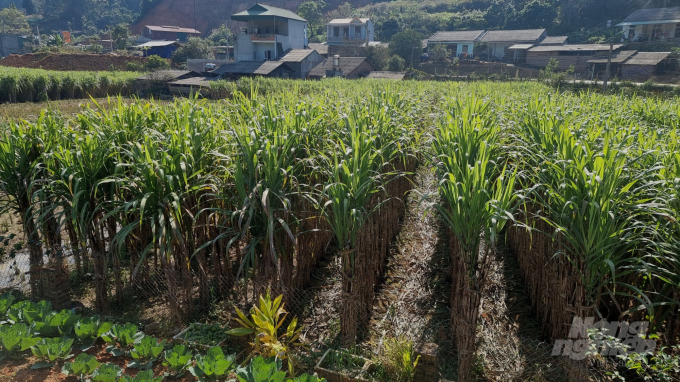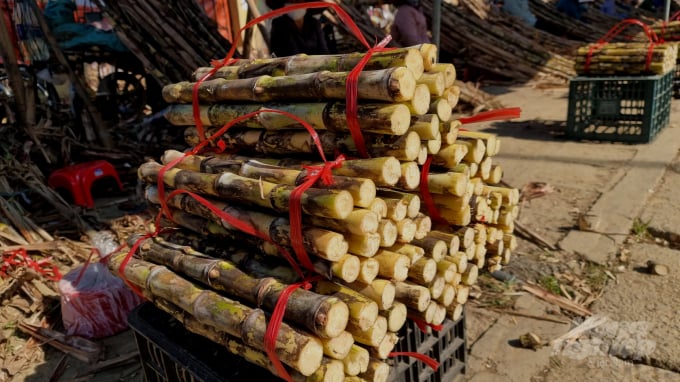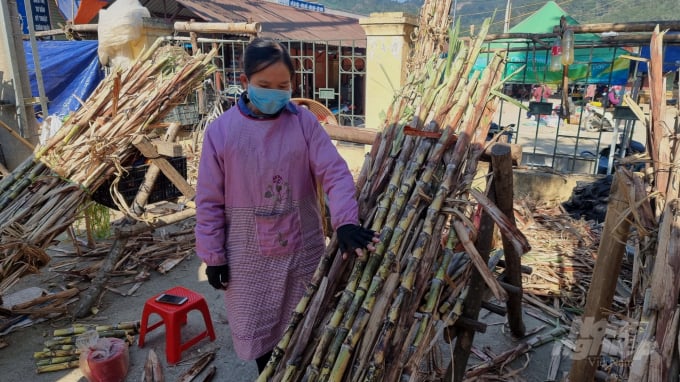May 17, 2025 | 07:42 GMT +7
May 17, 2025 | 07:42 GMT +7
Hotline: 0913.378.918
May 17, 2025 | 07:42 GMT +7
Hotline: 0913.378.918
Yellow sugarcane is a specialty plant that can only be grown along the riverbanks and valleys The Duc Commune and Nguyen Binh town, Nguyen Binh District. Thanks to the accretion of the river and a favorable climate, Nguyen Binh yellow sugarcane has its own special qualities such as yellow and soft skin easy to peel, long stem, soft yellow flesh, lots of water, sweet and fragrant taste ... so it has won the favor of many customers.

Lush green sugarcane gardens in Ban Nung hamlet, The Duc Commune, Nguyen Binh District. Photo: Cong Hai.
Yellow sugar cane has many outstanding features and advantages for development, so in recent years, households have expanded their area to increase their income. However, as growers do not consider the consumption capacity when growing and production areas increase, sugarcane prices have been fluctuating for many years. People often have to sell at cheap prices so could not earn a high economic value.
Ms. Luong Thi Lang from Ban Nung hamlet, The Duc Commune said in the past, her family only grew maize, rice, and raised livestock. When she found many people could earn high income from sugarcanes, she planted a few hundred roots. She also found prices of sugarcane were 5-7 times higher than that of corn and rice so, in recent years, her family has tried to expand the area.
This year, Lang's household planted about 3,000 sugarcane hollows. With the retail price of VND7,000-10,000/tree and the wholesale price of VND3,000 - 5,000/tree, she can get an average annual income is VND40-50 million. She said in some years when the price of sugarcane was high, she could even earn nearly VND100 million.
Meanwhile, Ms. Lanh Thi Thuyen in Ban Nung hamlet, Gym Duc Commune, said although she has been warned about the overconsumption of yellow sugar cane, the profit is 5-7 times higher than that of other plants. Thus, in recent years, her family has grown an average of 3,000 - 5,000 hollows (equivalent to 12,000 - 25,000 harvested sugarcane plants). If the selling price is stable, the family can earn more than VND100 million per year. However, in some years when the price of sugarcane was very low, mainly sold the whole garden to traders, her income was reduced by half.

Nguyen Binh yellow sugarcane has a soft peel, a lot of sweet and fragrant water with an aromatic special taste. Photo: Cong Hai.
Mr. Lanh Duc Khoi, Chairman of the People's Committee of The Duc Commune said sugarcane areas have increased gradually in recent years. In some years, the whole commune planted more than 20 ha. This year, it planted more than 18 ha.
The increase in sugarcane acreage has led to difficulties in consumption. Selling prices turn to dropping, so now, the commune has propagated farmers to maintain and reduce the growing area so as to avoid wasting their labor and products.
Traveling through the markets in Nguyen Binh town towards Bao Lac District, visitors can find so many yellow sugarcane being sold on the two sides of the road. They can buy in bundles, in pieces or can choose trees and then cut them short to transport easily.

Many locals in Nguyen Binh District have earned a good income from yellow sugarcane. Photo: Cong Hai.
Ms. Hoang Thi Hoa, Head of Nguyen Binh District’s Agriculture and Rural Development Office said locals have continuously expanded sugarcane areas in recent years so the office has coordinated with local authorities at all levels to advise people not to massively expand the area. At the same time, the authority has encouraged farmers to rotate other crops, improve the soil and focus on taking good care of the planted sugarcane area ensuring nutrients and limiting pests.
According to Hoa, yellow sugarcane is bringing higher economic efficiency than corn and rice. This is an easy-to-grow and easy-to-care plant, suitable for the soil and climate conditions of some localities in the district. However, sugarcane is still a raw product and there is no solution for preserving and processing it into packaged items. The current concern is how to find a stable output and a firm stand for it in the market, contributing to increasing locals’ incomes.
In 2021, Nguyen Binh District has a total area of over 25 ha of yellow sugarcane of which, 18 ha in The Duc Commune, 6 ha in Nguyen Binh town, and more than 2 ha in Tam Kim Commune. Each ha can give more than 30 tons of yellow sugarcanes (about 25,000 - 30,000 trees). If each tree is sold at the average price of VND5,000, each ha can give an income of VND100 - 150 million, 3 - 5 times higher than that of growing corn and rice.
Translated by Linh Nguyen

(VAN) Cold-barn systems efficiently manage environmental and temperature conditions, which aids in the prevention of respiratory diseases in pigs and protects them from the vectors that transmit African swine fevers.

(VAN) To tackle challenges, the project 'Addressing key technical bottlenecks in the grouper supply chain in Vietnam' has been underway since 2024.

(VAN) The project 'Disease-Resilient and Sustainable Cassava Production Systems in the Mekong Region', funded by the Australian Center for International Agricultural Research (ACIAR), is being implemented from 2024 to 2028.

(VAN) Data from 10,000 farming households will help professionalize production organization and support the implementation of the One Million Hectares Program for High-Quality, Low-Emission Rice Cultivation.

(VAN) FAO Director-General QU Dongyu marks International Day of Plant Health at NENA conference.

(VAN) Deputy Minister of Agriculture and Environment Hoang Trung affirmed that floriculture and ornamental plants are a growing industry that receives significant global attention.

(VAN) The three staple crops dominating modern diets – corn, rice and wheat – are familiar to Americans. However, fourth place is held by a dark horse: cassava.